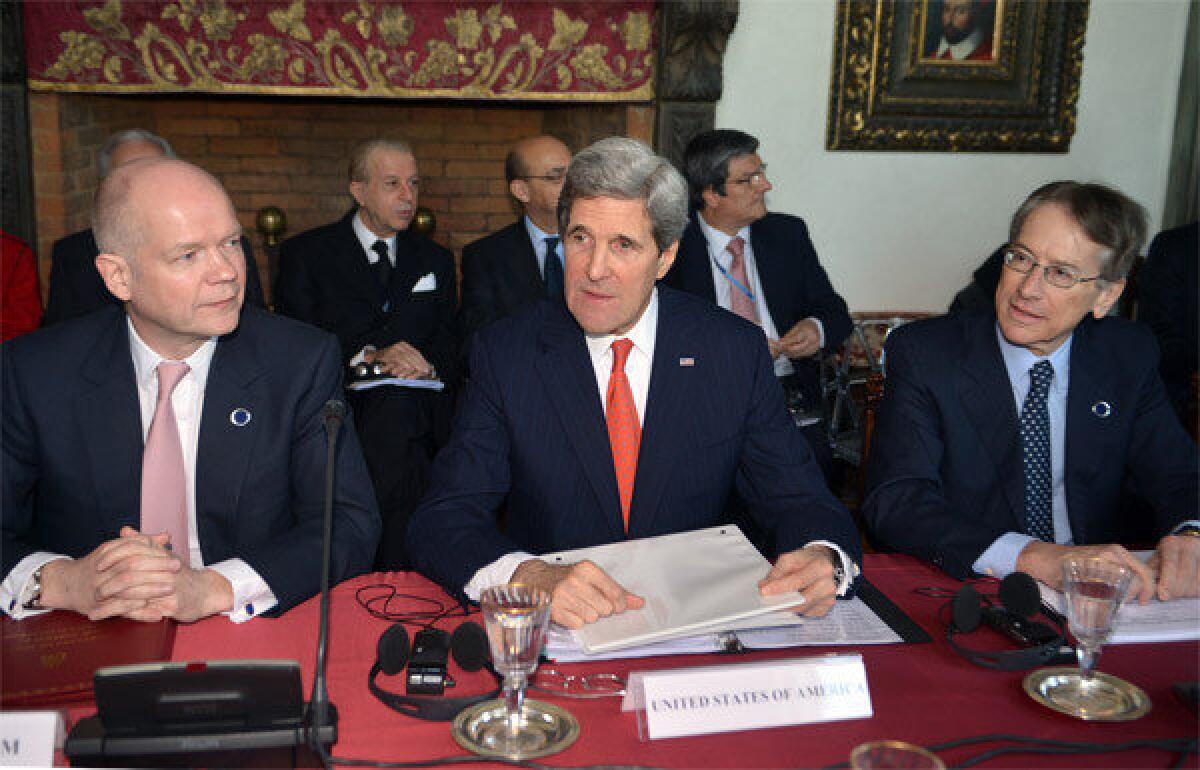Kerry pledges $60 million in aid to Syrian opposition forces

- Share via
ROME -- U.S. Secretary of State John Kerry pledged an additional $60 million in aid to Syrian opposition forces Thursday, including food and medical support directly to armed rebels for the first time but turning aside their demand for weapons.
Kerry, on his first foreign trip as America’s top diplomat, said that the extra assistance would help “the legitimate voice of the Syrian people,” who have been trying in vain for nearly two years to topple President Bashar Assad. Kerry said Assad had “long ago lost his legitimacy...and must be out of power.”
The $60 million more than doubles the amount that the Obama administration has so far given to the political opposition in Syria, and, in a policy shift, some of the aid will be funneled directly to armed rebels for the first time.
The food and medical supplies for the fighters, however, fall far short of their repeated requests for weapons and ammunition, which the U.S. has balked at sending for fear that they might wind up in the hands of Islamists who have joined the battle against Assad.
The Obama administration also declined to provide more defensive gear such as bulletproof vests and armored vehicles.
“We express our commitment to helping the Syrian people in order to achieve their goal to live in a free and a safe and a just society. Their goal is our goal,” Kerry told reporters in Rome, following a conference of international diplomats and members of Syria’s fractious civilian opposition coalition.
Syrian opposition leaders immediately expressed disappointment that Kerry did not move further toward the direct provision of weapons and other military aid to the rebels.
“It’s good but not good enough,” Saleh Mubarak, with the opposition Syrian National Council, told Al Jazeera English after Kerry’s comments.
There had been reports before Thursday’s session that Washington might be moving to provide the Syrian rebels with some nonlethal military equipment, such as body armor and armored vehicles.
The U.S. has given $54 million in aid to the political opposition and more than $350 million in humanitarian assistance to Syrian refugees.
Italian Foreign Minister Giulio Terzi, appearing with Kerry, said that a game changer was needed to resolve the intractable and bloody conflict in Syria.
“The suffering of the Syrian people is forcing us to go above and beyond the efforts that have been made up to now. We must be able to reach a turning point,” he said. “Seventy thousand victims are a huge weight on the conscience of the international community. We can no longer allow this massacre to continue.”
Flanking Kerry during his appearance in Rome was Moaz Khatib, who heads the National Coalition for Syrian Revolutionary and Opposition Forces, an umbrella group formed last year under prodding from Washington and other allied governments. The coalition said last week it would boycott the Rome meeting in protest of the world’s “shameful” silence about Syria. But U.S. officials pressured the coalition to attend, and Khatib reversed course.
Addressing Assad in far-away Damascus, Khatib repeated opposition demands that the Syrian leader step down. “You need to act like a human being for once in your life,” Khatib, a former preacher in the Umayyad Mosque in the capital, scolded the Syrian president.
Deep divisions have riven the Syrian opposition bloc. Exile-based groups have also struggled to gain legitimacy inside Syria, where dozens of rebel militias are battling the Syrian military.
On Saturday, the Syrian dissident coalition says it plans to appoint an interim government to rule “liberated” areas of Syria.
Despite Kerry’s avowed hopes for a political solution, the prospects for peace negotiations to end the almost two-year conflict appear slim.
The opposition insists that any talks must result in the ouster of Assad. The Syrian government says it will not agree to its own demise as a “pre-condition” for dialogue. A recent flurry of diplomatic maneuvering has so far failed to break the deadlock between the two sides’ positions on prospective talks.
Meanwhile, the United Nations and aid groups are issuing ever-more dire warnings about the disintegrating humanitarian scenario inside war-ravaged Syria and among the multitudes of refugees outside the country.
“The humanitarian situation is dramatic beyond description,” U.N. High Commissioner for Refugees Antonio Guterres said Wednesday. “The refugee crisis is accelerating at a staggering pace, month after month.”
Almost 1 million refugees have fled Syria, and more than 2 million people inside the country have been displaced, the U.N. says. Some 5,000 more Syrians flee the country each day, the U.N. says, straining the resources of neighboring nations such as Lebanon, Jordan, Turkey and Iraq.
Almost 70,000 people have died in the Syrian conflict, according to U.N. estimates.
ALSO:
U.S. official: Iraq continues to allow Iranian overflights to Syria
Three dead as gunman opens fire on colleagues at Swiss business
Thousands jam St. Peter’s Square for pope’s last general audience
More to Read
Sign up for Essential California
The most important California stories and recommendations in your inbox every morning.
You may occasionally receive promotional content from the Los Angeles Times.











